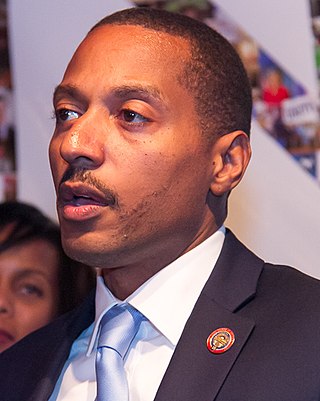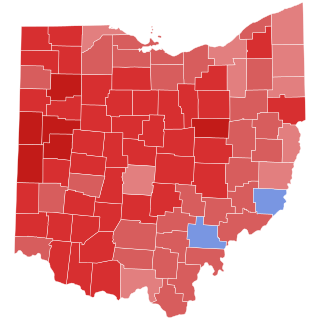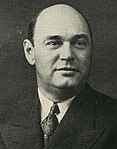
James Allen Rhodes was an American attorney and Republican politician who served as the 61st and 63rd Governor of Ohio from 1963 to 1971 and from 1975 to 1983. Rhodes was one of only seven U.S. governors to serve four four-year terms in office. Rhodes is tied for the sixth-longest gubernatorial tenure in post-Constitutional U.S. history at 5,840 days. He also served as Mayor of Columbus from 1944 to 1952 and Ohio State Auditor from 1953 to 1963.

Bruce Edward Johnson is an American lawyer and Republican politician who was appointed the State of Ohio's 63rd lieutenant governor on January 5, 2005, to complete an unexpired term. Johnson concurrently served as Director of the Ohio Department of Development.
Ohio's 3rd congressional district is located entirely in Franklin County and includes most of the city of Columbus. The current district lines were drawn in 2022, following the redistricting based on the 2020 census. It is currently represented by Democrat Joyce Beatty.

The 2004 United States Senate election in Ohio took place on November 2, 2004. It was concurrent with elections to the United States House of Representatives and the presidential election. Incumbent Republican U.S. Senator George Voinovich won re-election to a second term with the highest raw vote total in Ohio history. This remains the last Ohio statewide election to date in which a candidate won every county in the state.

Kevin L. Boyce is an American politician and a member of the Democratic Party who currently serves as President of the Franklin County Board of Commissioners. Formerly, he was a member of the Ohio House of Representatives from the 25th District from 2012 to 2016, a member of Columbus City Council, and was the 47th Ohio State Treasurer from 2009 to 2010.

The 2002 Ohio gubernatorial election took place on November 5, 2002. Incumbent Republican Governor of Ohio Bob Taft ran for re-election to a second and final term as governor, and he was opposed by Democratic nominee Tim Hagan, a former Cuyahoga County Commissioner. The race between Taft and Hagan was not competitive, and Taft was re-elected by a substantial margin, ensuring him a second term in office.

The 2014 Ohio gubernatorial election took place on November 4, 2014. Incumbent Republican Governor John Kasich won reelection to a second term in office by a landslide over Democratic candidate Ed FitzGerald and Green Party candidate Anita Rios. Primary elections were held on May 6, 2014.

The 2015 United States elections were held on Tuesday, November 3. The off-year election included a special election for Speaker of the House. There were also gubernatorial and state legislative elections in a few states; as well as numerous citizen initiatives, mayoral races, and a variety of other local offices on the ballot.

The Columbus mayoral election of 1967 was the 73rd mayoral election in Columbus, Ohio, United States. During the primary nomination on May 2, 1967, the Columbus electorate nominated Republican Jerry Spears, Jr., a businessman from the Hilltop neighborhood, and incumbent Democratic mayor Jack Sensenbrenner to compete in the mayoral election. On Tuesday, November 7, 1967, mayor Jack Sensenbrenner defeated Jerry Spears, Jr.

The Columbus mayoral election of 1975 was the 75th mayoral election in Columbus, Ohio. It was held on Tuesday, November 4, 1975. Democratic party nominee John Rosemond was defeated by incumbent Republican mayor Tom Moody.

The Ohio general elections, 2018, were held on November 6, 2018, throughout Ohio.
Derek Merrin is an American politician serving as the state representative for the 42nd District Ohio House of Representatives. He is a Republican. The district includes western Lucas County, south Toledo, Maumee and Springfield Township.

The 2019 United States elections were held, in large part, on Tuesday, November 5, 2019. This off-year election included gubernatorial elections in Kentucky, Louisiana, and Mississippi; regularly-scheduled state legislative elections in Louisiana, Mississippi, Virginia, and New Jersey; and special elections for seats in various state legislatures. Numerous citizen initiatives, mayoral races, and a variety of other local elections also occurred. Three special elections to the United States House of Representatives also took place in 2019 as a result of vacancies.

The 2020 United States House of Representatives elections in Ohio was held on November 3, 2020, to elect the 16 U.S. representatives from the state of Ohio, one from each of the state's 16 congressional districts. The elections coincided with the 2020 U.S. presidential election, as well as other elections to the House of Representatives, elections to the United States Senate and various state and local elections. Primaries were held on April 28, 2020.

The 2022 United States House of Representatives elections in Ohio were held on November 8, 2022, to elect the 15 U.S. representatives from Ohio, one from each of the state's 15 congressional districts. The elections coincided with other elections to the House of Representatives, other elections to the United States Senate, and various state and local elections. Primary elections took place on May 3.

The 2022 Ohio gubernatorial election was held on November 8, 2022, to elect the governor of Ohio. Incumbent Republican Governor Mike DeWine won re-election to a second term in a landslide, defeating Democrat nominee Nan Whaley, the former mayor of Dayton, 62.4% to 37.4%. DeWine's 25-point victory marked the continuation of a trend in which every incumbent Republican Governor of Ohio since 1994 has won re-election by a double-digit margin.

The 2023 United States elections were held, in large part, on Tuesday, November 7, 2023. The off-year election included gubernatorial and state legislative elections in a few states, as well as numerous citizen initiatives, mayoral races, and a variety of other local offices on the ballot. At least three special elections to the United States Congress were scheduled as either deaths or vacancies arose. The Democratic Party retained control of the governorship in Kentucky, flipped the Wisconsin Supreme Court and held a seat on the Pennsylvania Supreme Court, gained six seats in the New Jersey General Assembly, and won back unified control of the Virginia General Assembly, while Republicans also flipped the governorship in Louisiana and narrowly retained Mississippi's governorship. The election cycle also saw Ohio voting to enshrine abortion rights to the state constitution and legalized cannabis. The results were widely seen as a success for the Democratic Party.

Elections are currently held every four years to elect the mayor of Hartford, Connecticut.

Elections are held every four years in the off-year immediately after United States presidential election years in Albany, New York to elect the city's mayor.

The 2023 Wisconsin Spring Election was held in the U.S. state of Wisconsin on April 4, 2023. The featured race at the top of the ticket was for an open seat on the Wisconsin Supreme Court, which became the most expensive judicial election in history. Several other nonpartisan local and judicial offices were also decided on the April 4 ballot, including mayoral elections in some of Wisconsin's larger cities—Green Bay, Madison, and Racine. In addition, a special election was held in the 8th State Senate district, concurrent with the Spring elections. The 2023 Wisconsin Spring Primary was held February 21, 2023.


















